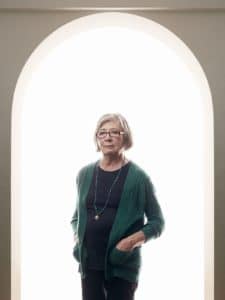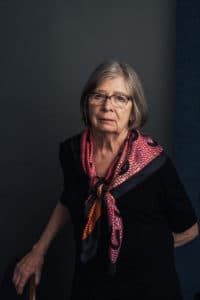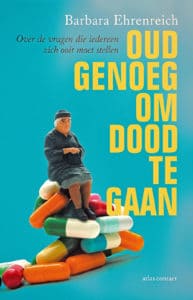We work out at the gym, diet like crazy and get screened for diseases as a precaution. Modern man does everything he can to get as old as possible. Wouldn't we be better off coming to terms with the fact that we are mortal, American writer Barbara Ehrenreich wonders in her book Old enough to die. For her in-depth journalistic work, she will receive the Erasmus Prize on Tuesday 27 November 2018.
The prestigious €150,000 prize is awarded annually to someone who has made extraordinary contributions in the fields of humanities, social sciences and the arts. Ehrenreich wrote among others The back of the American dream (Nickel and Dimed. On (Not) Getting By in America), for which she spent two years doing low-skilled work to investigate how millions of her compatriots have to make a living from it - many people barely manage to keep their heads above water even with two jobs. In Golden mountains she examined the hopeless situation of many people in the job market. The deceptiveness of the American dream is a common thread in her oeuvre.
Dry humour
Barbara Ehrenreich receives the Erasmus Prize because of "her courage to throw herself into the fray in her in-depth journalistic work. By living the lives of people in precarious situations herself, she gives a voice to groups that are otherwise unheard. She thus lets us see the world through different eyes. As a journalist, she uses several disciplines: she combines a scientific analytical method with a literary style, and her sharp pen is steeped in dry humour. She is an important voice in the current debate around truth-telling, and a champion of critical thinking and fact finding. She brings to life statistical data - e.g. on life at the bottom of the labour market - with empathy and social engagement driving it.'
For her most recent book Old enough to die Ehrenreich bowed to the health industry. In recent years, she began to be deeply disturbed by the huge amount of preventive research that Americans are offered as they age. People are too obsessed with living longer, not realising enough that they have no influence at all on many factors, Ehrenreich believes.

Growing old more relaxed
What is your main goal with this book?
'I write from two motives: I get angry about something or curious about something. I was outraged by the way ageing is dealt with in the medical world; the fact that you get more and more tests and screenings, advice on your diet, et cetera. And I was curious about what actually happens in the body as you get older. It is not a practical how-to book, with tips on how to live better. What I mainly hope to achieve with this book is that people start thinking about the subject and become a bit more relaxed instead of spending far too much time desperately extending their lives out of fear.'
In the United States, above a certain age, you are offered a bizarre amount of preventive tests. Is that the future prospect for the Netherlands too?
'It wouldn't surprise me. In America, it is disturbingly common. People in their 90s still have to undergo a mammogram or screening for prostate cancer. The mother of a friend of mine was still getting breast cancer treatment while she was 101. 101! Do you really want to have to endure chemotherapy and radiotherapy at that age? We ask ourselves far too little whether it makes sense for elderly people to still be treated for cancer. In my opinion, it makes no sense at all. The money involved would be better spent on good care for more people, such as dental care for children'.
Acceptance
Can we no longer accept that death is part of life?
'That is indeed the big problem. The medical and pharmaceutical industries have a great interest in offering all these preventive tests. After all, how else do you make money from people who feel fine? So they focus on tests, and then if something comes out at some point - which is very likely - more tests and treatments follow that were not needed at all. There is a strong social trend that says we should control our bodies and do everything we can to extend our lifespan, often with celebrities as ambassadors. Health has become the greatest good.'
Health is almost a new religion.
'Indeed. The other day I asked a Dutch woman whether avocados are eaten as much in your country. 'Definitely,' she said. It's impossible to keep up with all these fads. I myself decided long ago that I eat what tastes good and takes away my hunger; that is my only rule. I refuse to devote all my money and intellect to searching for what is the very best food.'

New vision
Do we need a new vision of the body and health?
'That is an important question. Yes, with this book I aim to overturn the prevailing idea that the human body is a harmonious system. Our body is a battleground at the cellular level. Mindfulness, positive thinking or drinking kombucha will not help against it. Reversing the social trend can only be done with small steps. My small step is to expose misconceptions, problems and contradictions. In doing so, I hope to make ageing easier for others. I am 76 myself and many of my friends - many of whom are also younger than me - spend so much energy and time trying to figure out how to get older. That has become the ultimate goal: to stretch life as long as possible. Is that really the way we want it? I myself have better things to do with my time. I would rather spend it with my loved ones.'
Barbara Ehrenreich, Old enough to die. On the questions everyone should ask themselves at some point has been published by Atlas Contact, €19.99 


